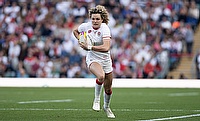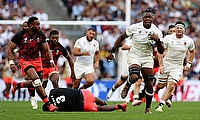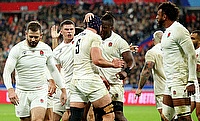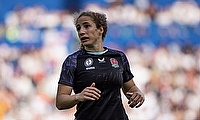England's Women win BBC's Team of the Year
On Sunday evening, the England women’s rugby team were crowned Team of the Year at the prestigious BBC Sports Personality of the Year awards, following a fine campaign that saw them lift the Women’s Rugby World Cup earlier this year.
The award proves a fitting end to an extraordinary year for the team, who not only lifted the World Cup after beating Canada 21-9 in Paris in August, but also saw the Women’s Sevens squad turn professional in the months following, as 20 players signed central contracts with the Rugby Football Union. The World Cup winners saw off competition from the victorious European Ryder Cup team and the Mercedes F1 team, the latter of whom helped the Sports Personality of the Year award winner, Lewis Hamilton, to his second world title.
Players such as Marlie Packer, Kay Wilson, Emily Scarratt and Maggie Alphonsi were amongst the stars of the tournament for England and thanks to Sky Sports’ coverage of the event, became household names amongst rugby fans who may never have even taken in a women’s rugby game before.
Their success, both at the tournament and by winning the Team of the Year award, could well prove to be watershed moment not only in women’s rugby, but in women’s sport at large, as the award went to a women’s team for only the second time in its 45-year history, and for the first time since the British Women’s 4 x 400m relay team shared the award with the European Ryder Cup team in 1969.
England captain Katy McLean was understandably delighted, describing the moment as a “massive turning point in women’s sport” and was also quick to offer up thanks to the RFU, Sport England and to friends and family for all the help they provided in ensuring England won the second World Cup in their history and first since 1994.
There were disappointments on Sunday however, as the team’s coach, Gary Street, missed out on the Coach of the Year award, which instead went to Europe’s Ryder Cup captain Paul McGinley. None of the England team were on the 10-person shortlist for the evening’s biggest award either, something which would have been inconceivable following the men’s RWC triumph in 2003, which saw Jonny Wilkinson pick up the coveted award, whilst his teammate and captain Martin Johnson was also on the shortlist.
With all that said, media coverage of women’s rugby is rising in the UK, in large part due to successes such as this, and there can be no doubt that women’s sport in general is trending upwards. There may still be a disheartening disparity in finances and awareness to bridge with their male counterparts, but anyone who watched the enthralling WRWC this year will know that there is no such disparity on the pitch.
The England women will now begin preparing for their upcoming Six Nations campaign in 2015, as well as continuing to compete in the World Rugby Women’s Sevens Series, with an eye undoubtedly on the Olympics in Rio in 2016.








